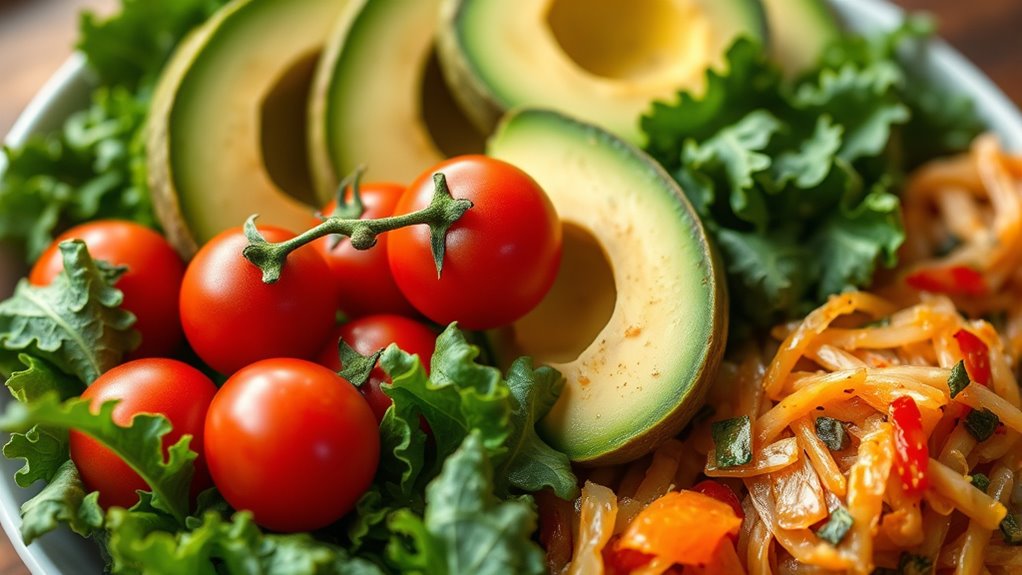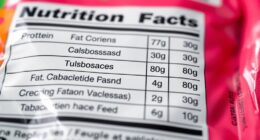To support a happy belly and brain, focus on eating a diverse range of fiber-rich fruits, vegetables, whole grains, and fermented foods like yogurt and sauerkraut. Incorporate prebiotics such as garlic and onions to nourish beneficial microbes, and enjoy polyphenol-rich berries and teas for added microbiome benefits. Monitoring your body’s responses will help tailor your diet, and exploring personalized strategies can boost your gut and mental health even more. Keep exploring how to optimize your gut for overall well-being.
Key Takeaways
- Incorporate diverse, fiber-rich foods like fruits, vegetables, and whole grains to promote microbiome diversity and resilience.
- Include fermented foods such as yogurt, kefir, sauerkraut, and kimchi to introduce beneficial probiotics.
- Consume prebiotic foods like garlic, onions, leeks, and chicory to nourish beneficial gut bacteria.
- Eat polyphenol-rich foods like berries, tea, and red wine to support microbiota diversity and gut-brain communication.
- Personalize your diet by microbiome testing and AI insights to optimize gut health and enhance mood and cognitive function.
Understanding the Gut Microbiome and Its Functions
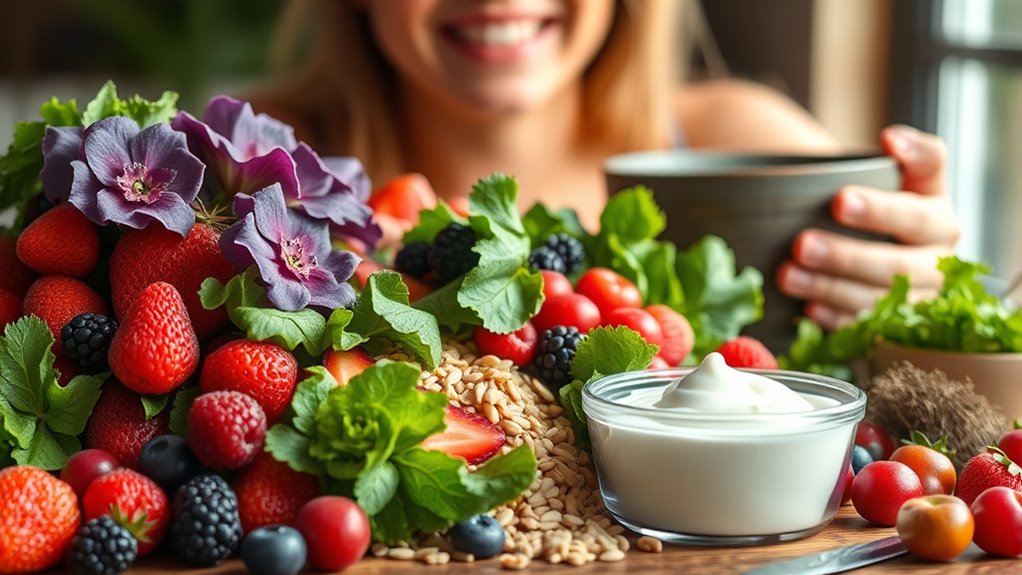
The gut microbiome refers to the diverse community of trillions of microorganisms living in your digestive tract. These tiny organisms, including bacteria, fungi, and viruses, work together to keep your body functioning properly. They help break down food, extract nutrients, and produce essential vitamins. Your microbiome also plays a key role in regulating your immune system, protecting against harmful pathogens. Additionally, it influences your mood and mental health through the gut-brain axis. The balance of these microbes affects your overall health—too many harmful bacteria or too few beneficial ones can lead to issues like digestive discomfort or inflammation. Maintaining a healthy microbiome is vital, as it directly impacts digestion, immunity, and even your mental well-being. Understanding these functions helps you appreciate why nurturing your gut matters, especially considering how microbial diversity supports overall health.
How Your Diet Shapes Microbial Diversity
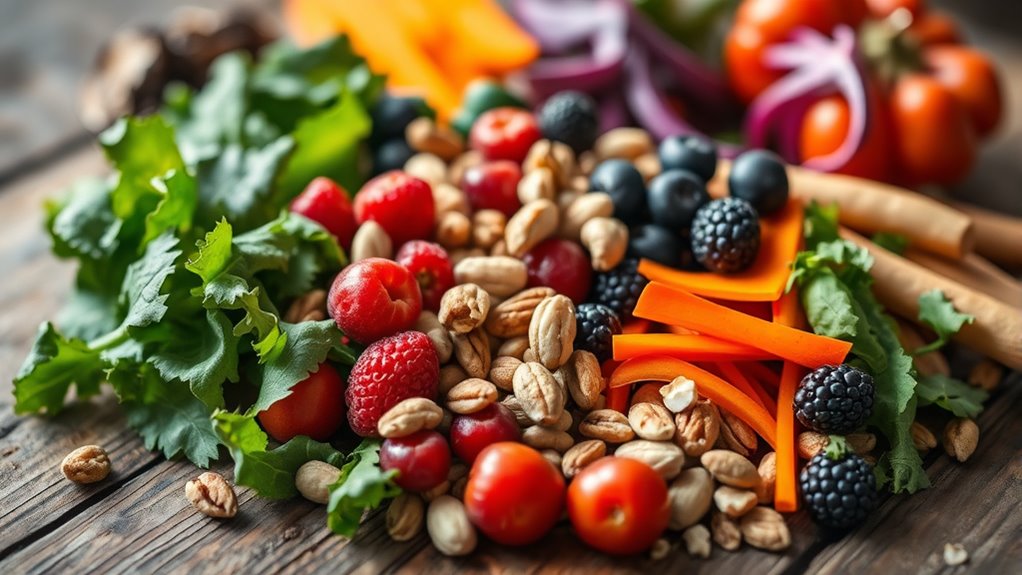
Your diet plays a crucial role in shaping the diversity of your gut microbiome. When you eat a variety of foods, especially fiber-rich fruits, vegetables, and whole grains, you feed a broad range of beneficial bacteria. These foods promote microbial richness, which supports better digestion, immune function, and mental health. Consuming a diverse array of dietary components can further enhance microbial diversity. Conversely, consuming high amounts of processed foods, sugar, and unhealthy fats can reduce diversity, favoring harmful bacteria and leading to imbalances. Diversity is essential because a varied microbiome is more resilient and better at protecting against disease. By choosing a colorful, nutrient-dense diet, you encourage a thriving, balanced microbial community. This diversity forms the foundation for overall health, helping your body function at its best and supporting your mental well-being.
Boosting Gut and Brain Health With Prebiotics and Probiotics
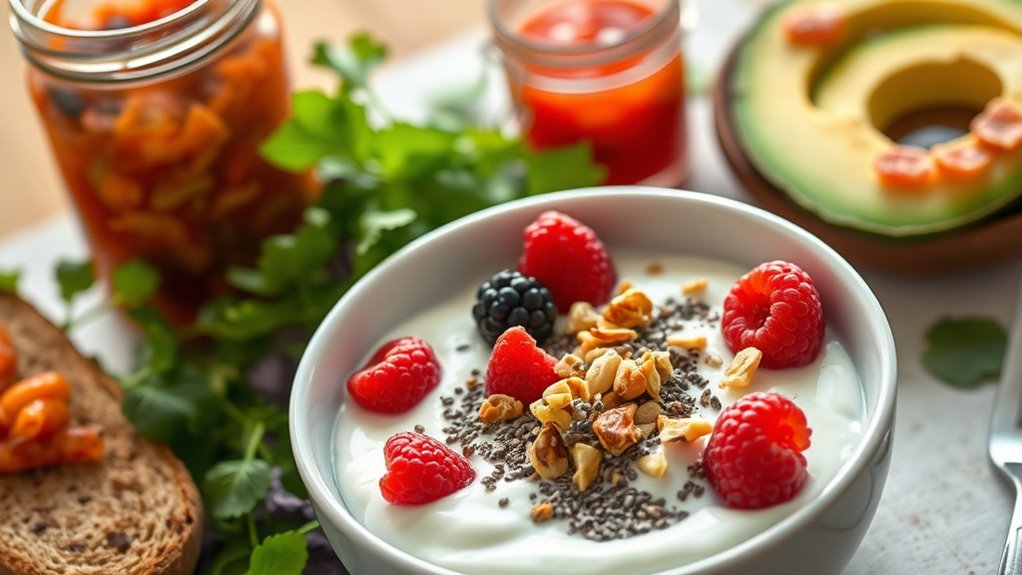
Prebiotics and probiotics work together to enhance both gut and brain health by supporting the growth of beneficial bacteria. Prebiotics, found in fiber-rich foods like garlic, onions, and bananas, serve as fuel for good bacteria, helping them thrive. Probiotics, present in fermented foods such as yogurt, kefir, and sauerkraut, introduce live beneficial microbes directly into your gut. When combined, they create a synergistic effect that strengthens your microbiome’s balance. This improved balance can boost digestion, reduce inflammation, and support mental clarity. You’ll notice better mood, reduced anxiety, and sharper focus as your gut-brain axis functions more efficiently. Incorporating both prebiotics and probiotics into your daily diet is a simple yet powerful way to promote overall well-being and mental resilience. Supporting gut health through proper nutrition can also help maintain the integrity of the gut barrier, further enhancing your overall health.
The Role of Polyphenols in Supporting a Healthy Microbiome
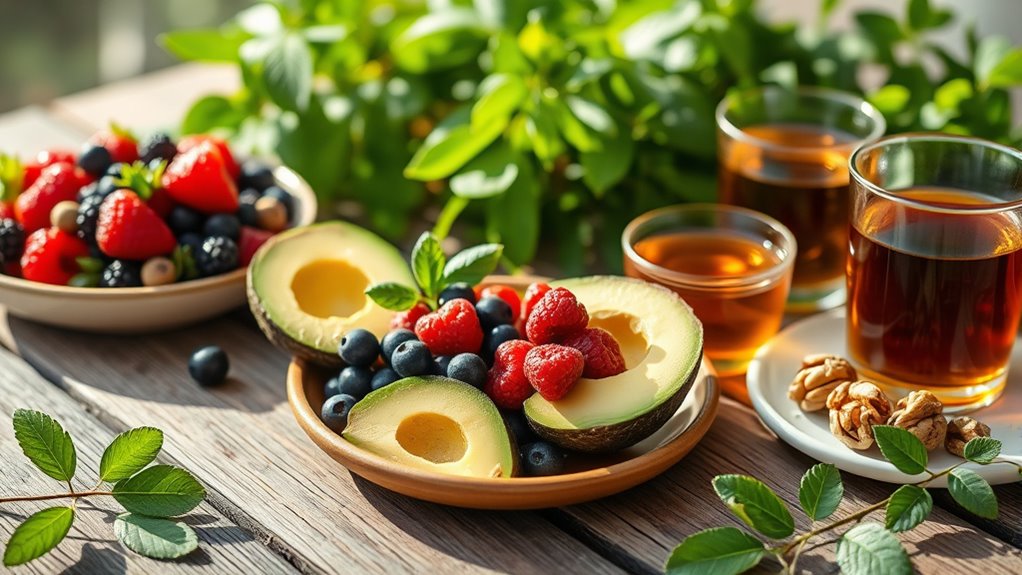
Building on the benefits of prebiotics and probiotics, incorporating polyphenol-rich foods can further enhance your gut microbiome’s diversity and stability. Polyphenols are plant compounds found in fruits, vegetables, tea, and red wine that support beneficial bacteria growth and activity. They act as antioxidants and fuel for microbiota, promoting a balanced environment. For example, berries nourish *Akkermansia*, while green tea boosts *Lactobacillus*. Here’s a quick snapshot:
| Food Source | Key Polyphenols | Microbiome Benefit |
|---|---|---|
| Berries | Anthocyanins | Increase diversity |
| Green Tea | Catechins | Promote beneficial bacteria |
| Red Wine | Resveratrol | Support metabolic regulation |
| Leafy Greens | Flavonoids | Reduce inflammation |
Adding these foods helps your gut thrive naturally. Supporting gut diversity through diverse polyphenol sources can optimize overall microbiome health.
Connecting Gut Wellness to Mood and Cognitive Performance

The gut microbiome plays a pivotal role in shaping mood and cognitive performance through the gut-brain axis, a bidirectional communication system connecting your digestive system and brain. Your gut bacteria produce neurotransmitters like serotonin and GABA, which influence how you feel and think. They also generate metabolites that can cross the blood-brain barrier, impacting inflammation and brain function. When your microbiome is balanced, it helps regulate stress responses and enhances mental clarity. Conversely, an imbalance can contribute to anxiety, depression, and cognitive fog. By maintaining a healthy gut through diet—rich in fiber, fermented foods, and polyphenols—you support the microbiota’s ability to produce mood-stabilizing compounds. Additionally, remote hackathons can foster innovation in health research, including microbiome studies, by bringing together diverse expertise from around the world. This connection underscores how gut health directly influences your emotional well-being and mental performance.
Strategies to Reduce Inflammation and Enhance Immunity
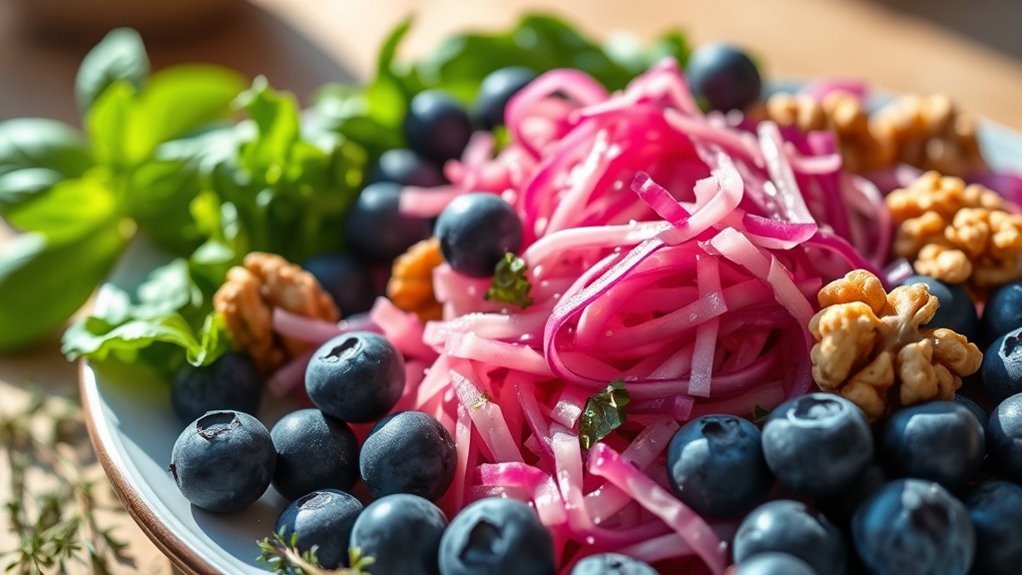
Reducing inflammation and boosting immunity are essential strategies for maintaining overall health, especially as chronic inflammation can contribute to various diseases. To do this effectively, you should focus on:
- Eating an anti-inflammatory diet rich in fruits, vegetables, and healthy fats like omega-3s, which help lower systemic inflammation.
- Incorporating fermented foods such as yogurt, kefir, and sauerkraut to support beneficial gut bacteria that regulate immune responses.
- Limiting processed foods, sugars, and trans fats that can trigger inflammation and weaken immunity.
- Staying physically active, as regular exercise enhances immune function and reduces inflammation markers.
Enhancing Performance and Recovery Through Microbial Balance
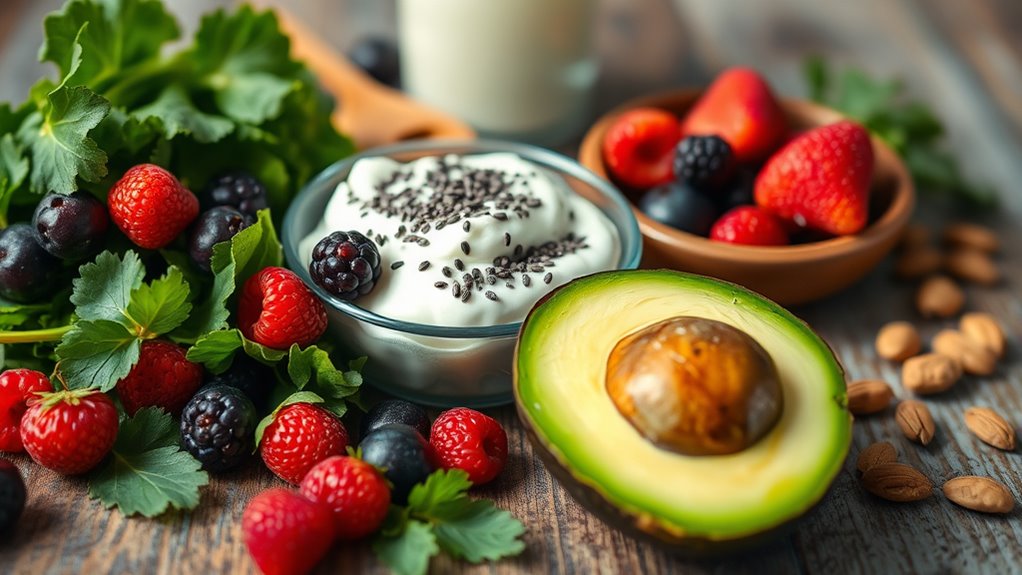
Maintaining a balanced gut microbiome is essential for optimizing athletic performance and speeding up recovery. When your gut bacteria are in harmony, your body absorbs nutrients more efficiently, fueling your workouts and aiding muscle repair. A healthy microbiome also reduces systemic inflammation, which can hinder recovery and cause fatigue. Beneficial microbes support immune function, lowering your risk of illness during intense training cycles. Additionally, a balanced microbiome influences mental resilience, helping you manage stress and stay focused. Incorporate fiber-rich foods, fermented products, and probiotics to nurture your gut bacteria. Understanding microbiome diversity is crucial for tailoring dietary choices that maximize health benefits. By supporting your microbiome, you enhance nutrient utilization, reduce inflammation, and strengthen your body’s natural defenses—all vital for peak performance and faster recovery. A healthy gut truly powers your athletic journey.
Personalized Nutrition: Tailoring Diets to Your Microbiome Profile
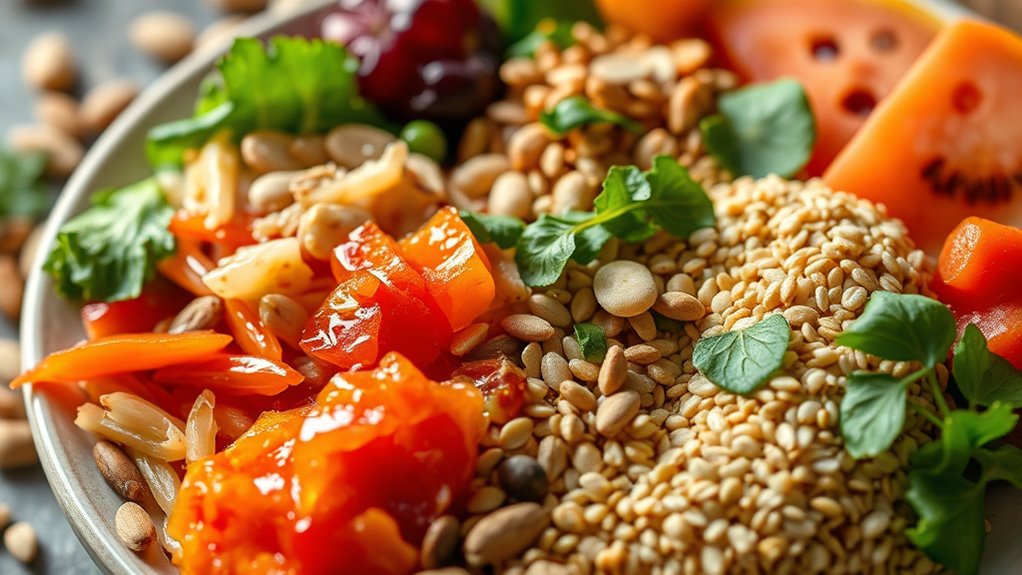
Optimizing your diet for peak performance and recovery involves more than generic advice; it requires understanding your unique gut microbiome. To personalize your nutrition:
- Get tested to identify your microbiome composition through stool analysis or DNA testing.
- Identify beneficial bacteria present and those lacking, guiding targeted dietary choices.
- Adjust your intake of prebiotics, probiotics, and fiber to support your specific microbiome profile.
- Monitor your responses over time, noting changes in digestion, mood, and energy levels.
- Incorporate nutrient-rich ingredients that are effective for detoxification and supporting metabolism, tailored to your microbiome needs.
Cutting-Edge Research and Future Directions in Gut Microbiome Science
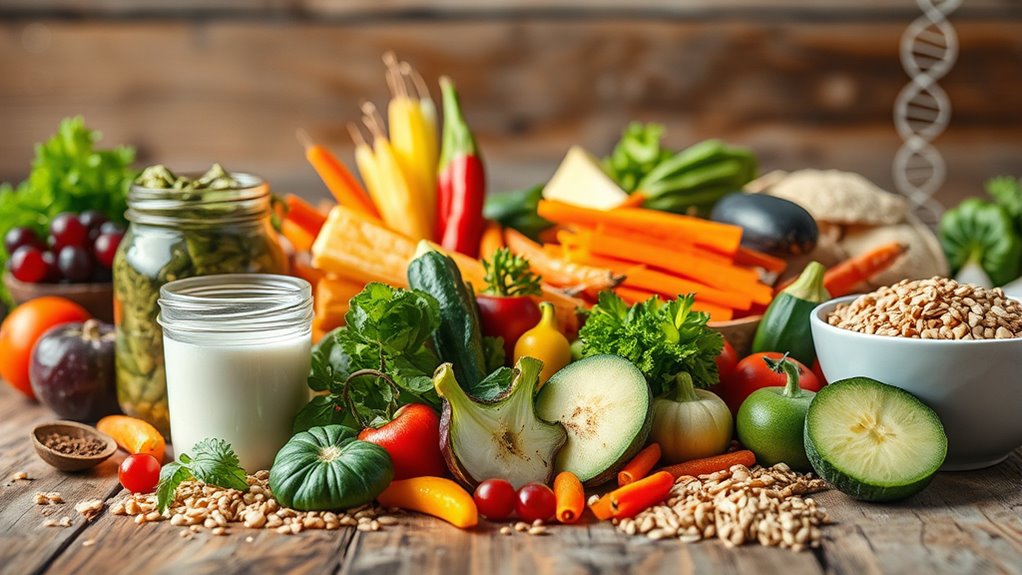
Recent breakthroughs in gut microbiome science focus on personalized therapies and AI-driven insights, offering new ways to optimize your health. Researchers are developing targeted treatments that adapt to your unique microbiome profile, making interventions more effective. As technology advances, expect to see more precise recommendations and therapies that can transform your approach to gut health. Additionally, understanding the role of the gut microbiome in overall health is increasingly important for developing effective treatments.
Personalized Microbiome Therapies
Personalized microbiome therapies are emerging as a promising frontier in gut health science, leveraging individual microbiome profiles to tailor treatments that maximize effectiveness. You can benefit from these targeted approaches by understanding your unique microbial makeup. Here are some ways this field is advancing:
- Microbiome Sequencing: Analyzing your gut bacteria to identify imbalances and guide personalized interventions.
- Custom Probiotics: Developing probiotic formulations designed specifically for your microbiome composition.
- Tailored Diet Plans: Creating nutritional strategies that foster beneficial bacteria unique to you.
- Microbiome Modulation: Using targeted prebiotics or microbiota transplants to restore balance efficiently.
This approach aims to optimize gut health, boost immunity, and improve mental well-being through individualized treatment strategies.
AI-Driven Microbiome Insights
Artificial intelligence is transforming gut microbiome research by enabling scientists to analyze complex microbial data quickly and accurately. With AI, you can now identify patterns and relationships within vast datasets that were previously difficult to decipher. Machine learning algorithms predict how specific bacteria influence health outcomes, guiding personalized nutrition and treatment plans. Researchers are developing AI models to forecast microbiome responses to diet changes, offering tailored strategies for gut health optimization. AI also accelerates the discovery of microbiome-targeted therapies by pinpointing key bacterial strains for intervention. As these technologies advance, you’ll see increasingly precise recommendations, making gut health management more effective and accessible. The integration of AI in microbiome studies also benefits from advanced data processing speeds, enabling real-time analysis and faster scientific discoveries. This integration of AI promises a future where understanding your microbiome becomes seamless, personalized, and a cornerstone of overall wellness.
Practical Tips for Maintaining a Happy and Resilient Belly
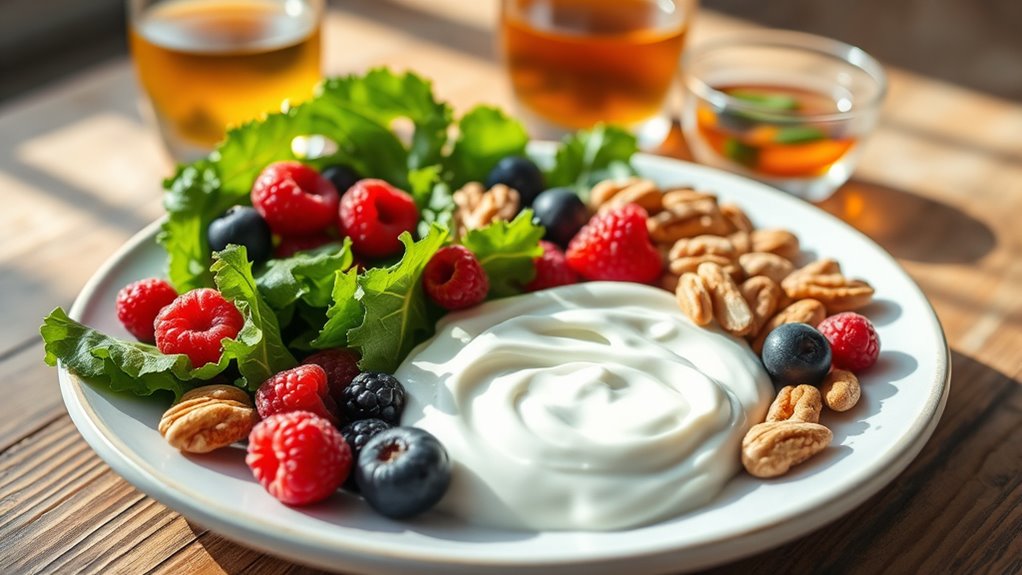
You can support your gut health by incorporating a variety of prebiotic-rich foods and fermented options into your diet. Remember, personalizing your nutrition based on how your body responds makes a big difference. Start making small changes today to keep your belly happy and resilient. Including chia seeds, which are rich in fiber, can help promote a healthy gut microbiome and improve digestion.
Incorporate Diverse Prebiotics
Incorporating a variety of prebiotics into your diet is a simple yet effective way to support a diverse and resilient gut microbiome. Different prebiotics feed different beneficial bacteria, boosting overall diversity. To maximize results, consider:
- Eating garlic, onions, and leeks regularly, as they contain inulin and fructooligosaccharides.
- Including whole grains like oats and barley to provide beta-glucans.
- Snacking on chicory root or Jerusalem artichokes, rich in prebiotic fibers.
- Adding bananas and apples, which supply natural prebiotics and fiber.
Consume Fermented Options
Consuming fermented foods is a practical way to boost your gut health and support a resilient microbiome. Fermented options like yogurt, kefir, sauerkraut, kimchi, tempeh, and miso introduce beneficial bacteria directly into your digestive system. These probiotics help diversify your gut flora, improve digestion, and strengthen your immune response. Incorporate fermented foods into your meals regularly, aiming for a variety of types to maximize benefits. Choose unpasteurized and minimally processed options to guarantee live cultures are preserved. You don’t have to overhaul your diet—adding a small serving daily or a few times a week can make a significant difference. Remember, fermented foods are an easy, delicious way to nurture your microbiome and promote overall well-being.
Personalize Your Diet
Personalizing your diet is essential for achieving a healthy and resilient gut microbiome because each individual’s microbial composition responds uniquely to different foods. To do this effectively:
- Get tested to understand your microbiome profile and identify specific needs.
- Adjust your fiber intake based on your tolerance and microbial responses.
- Incorporate foods rich in prebiotics and probiotics tailored to your preferences.
- Monitor how your body reacts to new foods, and refine your diet accordingly.
Frequently Asked Questions
How Long Does It Take to See Gut Microbiome Improvements After Dietary Changes?
You can start noticing gut microbiome improvements within a few days to a few weeks after making dietary changes. When you consume more prebiotics, fermented foods, and fiber, beneficial bacteria begin to thrive quickly. However, for significant and lasting changes, it might take several weeks to months. Consistency is key; sticking with healthy habits guarantees your gut microbiome continues to evolve positively over time.
Can Antibiotics Permanently Damage My Gut Microbiome?
Antibiotics can cause lasting damage to your gut microbiome, like a storm tearing through a peaceful forest, leaving some trees altered or missing. While your gut can recover over time, some beneficial bacteria might not fully return, especially after multiple courses. To help rebuild, include probiotic-rich foods, fiber, and fermented options in your diet. Patience and consistent healthy choices support your microbiome’s resilience and long-term health.
Are There Specific Foods to Avoid for Better Gut Health?
You should avoid processed foods high in sugar and refined carbs, as they can harm your beneficial bacteria. Limit intake of artificial sweeteners, excess alcohol, and fried foods, which can cause inflammation and imbalance in your gut. Also, cut back on excessive antibiotics unless prescribed, because they can wipe out good bacteria. Instead, focus on whole, fiber-rich foods to support a diverse and healthy microbiome.
How Does Stress Impact My Gut Microbiome and Overall Health?
Stress acts like a bulldozer on your gut microbiome, disturbing its delicate balance. It can reduce beneficial bacteria, increase inflammation, and weaken your immune defenses. You might notice digestion issues, mood swings, or fatigue as a result. To protect your health, find ways to manage stress—try exercise, meditation, or deep breathing. Keeping your mind calm helps your gut stay happy, which in turn supports your overall well-being.
Is It Necessary to Take Supplements or Probiotics Regularly?
You don’t necessarily need to take supplements or probiotics daily, but they can help maintain or boost your gut health, especially if your diet lacks diversity. Incorporating fermented foods, prebiotics, and a balanced diet often provides enough beneficial bacteria. However, if you have specific health issues or after antibiotics, supplements might be beneficial. Always consult with a healthcare professional to determine what’s best for your individual needs.
Conclusion
By nurturing your gut microbiome, you’re tending a vibrant garden within, where each healthy choice plants seeds of happiness and clarity. Embrace a diverse, colorful diet and listen to your body’s symphony, allowing your microbial allies to flourish. When your gut thrives, your mind dances in harmony, turning everyday moments into a tapestry of wellness. Ultimately, caring for your microbiome open the secret doorway to a happier, sharper, and more resilient you.
